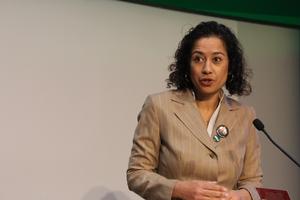“Amazing” judgment backs Samira’s equal pay claim
BBC presenter Samira Ahmed told the TUC Women’s conference how the NUJ won her case when she found a male colleague was paid six times more than her.

© NUJ
The whole room was on its feet, the applause long, loud and warm. Women delegates at the TUC were celebrating the NUJ's victory in winning an equal pay case for BBC presenter, Samira Ahmed, the conference's keynote speaker.
It had been a tough two years-plus for Samira, taking on her employer. She recalled reading the judgment over the shoulder of Michelle Stanistreet, NUJ general secretary. "It was amazing," she said.
"Over 40 pages my case was so clearly set out and all the things I had been saying were now backed up by a distinguished panel. I couldn't help hugging Michelle."
Samira had successfully challenged the BBC over being paid half the amount of her male predecessor on Front Row, the Radio 4 arts show, and being underpaid in comparison with male colleagues on Radio 3's Night Waves. But the BBC would not settle a third case – the fact that Jeremy Vine was being paid six times more than she was for presenting Points of View when her very similar programme, Newswatch. Both shows deal with viewers' opinions.
"Every man I asked, including Jeremy Vine, told me how much they were paid," she said. It was this co-operation that enabled her to pull her case together. But without the expert help of the legal team, paid for by her union, and support from Michelle Stanistreet and others at the NUJ, she could not have taken it forward.
"I talk a lot to young journalists about the importance of being a member of a union."
She was overwhelmed by the support she received from colleagues, fellow presenters, men as well as women, who were prepared to walk arm in arm with her, each day to the tribunal hearing, she added.
In answer to questions, she said it had been fine going back to work. The whole time she had not made it personal and always channelled Michelle Obama by remembering to "aim high", even when the BBC brought in her producer as a hostile witness.
After her talk, women delegates at the TUC's Women's Conference in London queued to have a selfie with the new poster girl for equal pay. Samira is always keen to reference other famous cases, such as the car workers at Dagenham and more recently women workers at Tesco and Asda disputing their pay in relation to the men working in the warehouse.
"It is good to see that people are taking their case to the law, but on the other hand it's outrageous that many women are still in this position."
Natasha Hirst, NUJ national executive member and delegate, introduced Samira, describing how her case had raised the profile of the NUJ and made people realise what unions were about. Despite its size, the NUJ had taken on the mighty BBC.
At a fringe meeting, organised by the Trade Union Co-ordinating Group held the previous day at conference, Caroline Underhill, of Thompsons Solicitors and one of Samira's legal team, said equal pay law was complicated. "The concept of equal pay is hard to understand and apply in practice," she said. "what is it not about is performance of the individual or the worth of the job." It was increasingly set by case law and enforcing the law could take many years.
"We did Samira's case in in one-and-a-half years (not counting the BBC's internal process), but most cases take longer than that – 10 to 15 years."
There is some good news: a recent GDPR case showed there was no general principle of law that wages have to be kept confidential. She added:
"A continuing narrative is that the male comparators have taken the pay of women and should give it back or take a pay cut. This is divisive and untrue. It is always the employer who makes decisions about pay."
The fringe meeting also heard from RMT president Michelle Rodgers who said the privatisation of the railways had been a disaster for women's pay. The outsourcing of the jobs had led to a web of contracts; 50 alone for Network Rail. This broke the collective bargaining unit.
"Everyone from cleaner to engineer once saw themselves as a railway worker and were represented by the union, but now the workforce is divided, making it difficult for us to organise," she said. The consequence is that the cleaners, 70 per cent of them women, are employed on wages significantly below the Living Wage.
Speaking to a motion on equal pay at conference, Natasha Hirst called for greater transparency in pay, so that women can make informed decisions about whether they are being paid fairly and properly. Employers must be compelled to tell women what their male compactors are being paid, she said.
It was the publication of a list of the so-called "BBC talent" (those getting more than £150,00) that opened the floodgates of women at the corporation making pay claims. Of that 2017 list, only a third were women and one in ten black or minority ethnic; the top twelve earners were men.
"We are still so far from equality that it almost defies belief," Natasha told delegates.
"Information is power. Greater transparency in pay is vital for securing our rights. I look forward to our movement building on the great success of Samira's case and others like her."
